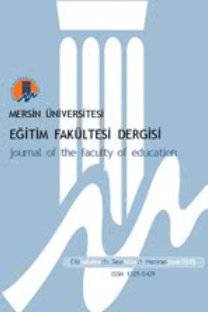The Comparing of European Union Countries and Turkey's social studies education programs in terms of human rightsand democracy education
The Comparing of European Union Countries and Turkey's social studies education programs in terms of human rightsand democracy education
___
- Açıkgöz, Ü.K. (2003). Etkili Öğrenme ve Öğretme. 4 Basım, İzmir: Eğitim Dünyası Yayınları.
- Bağlı, M.T. (2013). Ara-disiplin olarak vatandaşlık ve insan hakları eğitimi: ilköğretim öğrencilerinin insan haklarına ilişkin görüşleri, Eğitim ve Bilim, 38 (169), 296-310.
- Başaran, T. (2007). İlköğretim Okullarında Vatandaşlık ve İnsan Hakları Eğitimi Programının Uygulanışına İlişkin Sosyal Bilgiler Öğretmenlerinin Görüşleri, Yayınlanmamış yüksek lisans tezi. Trakya Üniversitesi, Sosyal Bilimler Enstitüsü, Edirne.
- Demir, Ö. (2009). Bilişsel Koçluk Yöntemiyle Öğretilen Bilişsel Farkındalık Stratejilerinin Altıncı Sınıf Sosyal Bilgiler Dersinde Öğrencilerin Epistemolojik İnançlarına, Bilişsel Farkındalık Becerilerine, Akademik Başarılarına ve Bunların Kalıcılıklarına Etkisi, Yayınlanmamış doktora tezi. Çukurova Üniversitesi, Sosyal Bilimler Enstitüsü, Adana.
- Demircioğlu, İ.H. (2008). Türkiyede Tarih Öğretimi Aktif Vatandaşlık Eğitimini Desteklemekte Midir? Tarih Öğretmenlerinin Görüşleri, 21. Yüzyılda kimlik, vatandaşlık ve tarih eğitimi (Ed. Safran, M ve Dilek, D.), İstanbul: Yeni İnsan Yayınevi.
- Demircioğlu, İ.H.; Mutluer, C.,ve Demircioğlu, E. (2011). Sosyal bilgiler öğretmen adaylarının demokratik öğretmen hakkındaki görüşleri, Kastamonu Eğitim Dergisi, 19 (2), 577-586. EC (European Commission) (2006). Efficiency and Equity in European Education and Training Systems. Communication from The Commission to The Council and to The European Parliament, 8.9.2006, COM (2006), 481 final. Eurydice- Network on Education Systems and Policies in Europe, 12 Nisan 2014 tarihinde http://eacea.ec.europa.eu/education/eurydice/index_en.php adresinden alınmıştır. EC (European Commission) (2012). The Role of Education and Training in The İmplementation Of The Europe 2020 Strategy (Avrupa 2020 Stratejilerinin Uygulanmasında Eğitim ve Öğretimin Rolü). 18 Ocak 2012 tarihinde http://ec.europa.eu/education/lifelong-learning-policy/doc1120_en.htm adresinden alındı.
- Kepenekçi, Y. (2000,a). İnsan Hakları, Ankara: AnıYayıncılık, 1. Baskı.
- Kepenekçi, Y. (2000,b). Türkiyede Genel Ortaöğretim Kurumlarında İnsan Hakları Eğitimi, Yayınlanmamış Yüksek Lisans Tezi, A. Ü. Sosyal Bilimler Enstitüsü, Ankara.
- Karaman Kepenekçi, Y. (2005). A study of effectiveness of human rights education in Turkey. Journal of Peace Education, 2(1), 39-55. MEB (2008). Sosyal Bilgiler Öğretmeni Özel Alan Yeterlikleri. Öğretmen Yetiştirme ve Eğitimi Genel Müdürlüğü. Ankara MEB (2012). Öğretmen Yeterlikleri. Öğretmen Yetiştirme ve Eğitimi Genel Müdürlüğü. Ankara MEB (2013). Sosyal Bilgiler Öğretmenliğinin Amacı, 12 Nisan 2014 tarihinde http://mebk12.meb.gov.tr/meb_iys_dosyalar/29/05/959745/dosyalar/2013_01/24105227_sosyalbilgile rretmenlii.pdf adresinden alındı.. MEB (2013). Öğretmenlik İçin Başvuru ve Atama Kılavuzu-2013 Yılı.12 Nisan 2014 tarihinde http://ikgm.meb.gov.tr/meb_iys_dosyalar/2013_09/03091530_son.pdf adresinden alındı. MEB (2014). Öğretmenlik Alanları ve Ders Okutma Esasları, Ankara: 6 Ağustos 2014 tarihinde http://ttkb.meb.gov.tr/meb_iys_dosyalar/2014_03/20112137_cizelgeveesaslar12.03.2014.pdf adresinden alındı.
- Murawski, W. W. ve Lochner, W. W. (2011). Observing Co-teaching: what to ask for look for and listen for, Intervention in School and Clinic, 46(3), 174-183. NCSS, (1992). A Vision of Powerful Teaching and Learning in The Social Studies: Building Social Understanding and Civic Efficacy. 6 Şubat 2014 tarihinde http://www.socialstudies adresinden alındı. T.T.K.B. (Talim ve Terbiye Kurulu Başkanlığı, 2014). İlkokullar ve Ortaokullar Haftalık Ders Çizelgesi, Talim Terbiye Kurulu Başkanlığı, Ankara: 6 Şubat 2014 tarihinde http://ttkb.meb.gov.tr/www/haftalik-ders-cizelgeleri/kategori/7 adresinden alındı.
- Yıldırım, A., ve Şimşek, H. (2008). Sosyal Bilimlerde Nitel Araştırma Yöntemleri, (6.Baskı), Ankara: Seçkin Yayıncılık. YÖK (2014).Yükseköğretim Kurulu Eğitim Fakülteleri Öğretmen Yetiştirme Lisans Programları, Sosyal Bilgiler Öğretmeliği Lisans Programı, 6 Şubat 2014 tarihinde http://www.yok.gov.tr/documents /10279/49665/sosyal_bilgiler.pdf adresinden alındı.
- Yayın Aralığı: 3
- Başlangıç: 2005
- Yayıncı: Mersin Üniversitesi Eğitim Fakültesi
Okul Öncesi Öğretmenlerinin Öğretmen Teftiş Formu’ndan Aldıkları Puanların Analizi
An evaluation on school guard duty of primary school teachers
Gökhan GÜNAY, Fatih Mutlu ÖZBİLEN
Mikro öğretimin öğretmen adaylarının sınıf yönetimi tutum ve inançlarına etkisi
Fen ve Teknoloji Dersinde Portfolyo Kullanımının Öğrenci Başarısı ve Kalıcılığa Etkisi
Examination of teacher views about ımplementation science course with regard to different variables
Ümit ŞENGÜL, Emre BOZDOĞAN, Betül BOZDOĞAN
“Bilim Uygulamaları” Dersi ile İlgili Öğretmen Görüşlerinin Farklı Değişkenler Açısından İncelenmesi
Betül BOZDOĞAN, Aykut Emre BOZDOĞAN, Ümit ŞENGÜL
Fen Bilgisi Öğretmen Adaylarının Mikroskop Kullanım Bilgilerinin İncelenmesi
